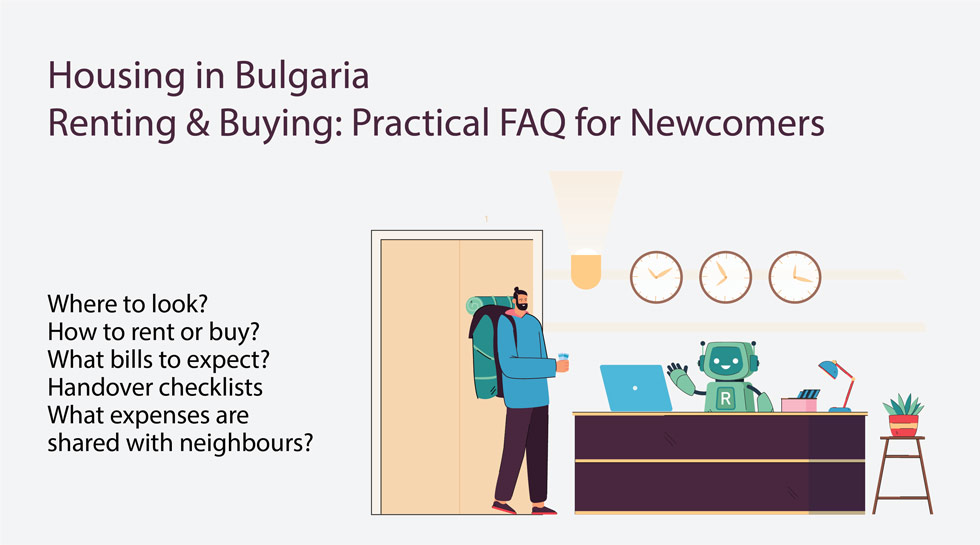Where can I find rentals or homes for sale?
Use Bulgaria’s big property portals, agency sites, and (carefully) curated Facebook groups. Compare listings across several sources.
Popular rental & sales portals include large classifieds and real-estate networks. Look for robust filters (district, size, heating, furnished, pets) and check the map view to compare transport and amenities.
Good practice: short-list 6–10 homes and book same-day viewings—quality listings move quickly in big cities.
Typical sources:
- Portals: Imot.bg, Imoti.net, Imoteka.bg, Properties.bg
- Agencies: Address, MIRELA, Unique Estates, RE/MAX Bulgaria, ARCO, First Estates
- English-friendly pages: Many agencies maintain English sections; you’ll also find expat-oriented listings.
Tips: Beware duplicates (the same home via multiple agents), and “illustrative photos” remarks on adverts. Always verify the exact address, floor plan, heating type, and real photos before committing. Visiting the property is essential.
Are apartments furnished or unfurnished?
Furnished is common in city rentals; part-furnished or unfurnished appear more in long leases and new builds. You can often negotiate furniture removal/additions.
Expect furnished kitchens (stove/oven, fridge) and basic furniture; washing machines are typical, dishwashers less so. Ask for an inventory list and photos in the contract. For long-term leases (12+ months), landlords may agree to remove bulky items or add essentials.
How much are deposits, agency fees, and upfront costs?
Most rentals require a monthly deposit + 1st month’s rent. Agency fees are commonly half to one month’s rent (clarify who pays). For purchases, plan ~4–6% on top of the price for taxes/fees.
- Deposit (caution): usually 1 month’s rent; occasionally 2 for pets/high-value furniture.
- Agency fee: varies—some charge the tenant 50–100% of one month’s rent; the owner pays some; some split. Negotiate first, and then confirm in writing.
- Utilities: often included; see bills section.
What monthly bills should I expect?
Rent + electricity + heating (district, gas, or electric) + water/sewer + internet/TV + building/standard fees. Waste tax is an annual owner tax, but may be passed through in the rent.
- Electricity: two-tariff meters (day/night) are standard; winter bills rise if you heat with electricity. Electricity in Sofia and other major cities may be at par or more expensive compared to the average EU levels.
- Heating: district heating has seasonal equalization (you might pay a settlement at season’s end). See the next section below.
- Water & sewer: billed monthly; often, a building rep reads meters.
- Internet/TV: fast fiber is widely available; packages are inexpensive vs. the EU average.
- Building/standard fees: condominium/entrance fees for cleaning, lights, lift, caretaker/manager (a few to ~20+ BGN/month, more in gated complexes).
- Waste tax: an annual municipal tax typically paid by the owner; check if your rent includes it.
What heating types are common, and what should I know?
District heating (radiators), gas boilers, electric AC/heat pump, or electric radiators. District heating is convenient but requires annual equalization; electric heating is flexible but can be more expensive in winter.
- District heating (Toplofikatsiya): building radiators with apartment allocators; you pay a base fee + usage. Bills are reconciled annually (you may owe extra or get a refund). Warm and low-maintenance; tricky to fine-tune per room.
- Gas: efficient with reasonable control; check for gas line, boiler maintenance, and CO safety.
- Heat pump/AC: common in newer, well-insulated flats—efficient if the home is sealed.
- Electric radiators: simple but can be expensive in cold months.
Ask for the last 12 months of bills to set realistic expectations.
What should I do at handover (move-in)?
Sign the lease + inventory/handover protocol; record meter readings (electricity, water, heating) and take date-stamped photos.
- Handover protocol (приемно-предавателен протокол): list keys/fobs, appliances, furniture, visible defects.
- Meters: note electricity, water, and heating readings in the protocol (attach photos).
- Access & rules: building door code, parking rules, quiet hours, pet policy, and mailbox.
- Insurance: consider contents insurance (inexpensive, quick to set up).
Keep a PDF/scan of all documents and photo evidence.
Who pays for minor repairs? How do I report defects?
Minor wear-and-tear items are often the tenant’s (up to an agreed cap); major repairs/appliance failures are the landlord’s—report defects in writing ASAP with photos.
Many leases include a minor-repairs cap (e.g., 50–100 BGN per incident). Any structural or appliance failure without tenant fault is the owner’s responsibility. Send a defect list within 3–7 days of move-in; for urgent issues (leaks, electrical hazards), notify immediately and keep receipts if you must act fast.
How do I set up electricity, water, and internet?
Either stay on the owner’s existing accounts and reimburse monthly, or transfer/open accounts in your name (some landlords prefer to keep utilities in their name).
- Electricity & water: the building or landlord will explain the local provider. If you are transferring to your name, please bring your lease, ID, and meter numbers; some providers allow online requests.
- Internet/TV: national providers (e.g., A1, Vivacom, Yettel) and strong local ISPs offer fast fiber. You’ll need ID and an address; standard contracts are 12–24 months, with no-term options at a higher monthly price.
Any tips to avoid misunderstandings and negotiate?
Never pre-pay before you view and sign. Verify ownership, insist on a written contract (BG/EN), and pay by bank transfer.
- Ask for the owner’s ID and proof of ownership (title excerpt).
- Verify the exact address and floor plan; check heating type and orientation (south = warmer in winter).
- Put all promises in writing (repairs, furniture changes).
- Use a handover protocol + photos; keep all payments documented.
- Negotiate: longer leases often secure a better rate or upgrades (AC, dishwasher, paint).
Shared expenses (condominium fees) & waste tax
Expect a small building/entrance fee for common areas; waste tax (TBO) is an annual owner tax (sometimes built into rent).
- Condominium fees: cleaning, lighting, lift, caretaker/manager. Amount depends on building size/services; gated complexes are higher.
- Waste tax (TBO): paid to the municipality annually by the owner; tenants typically do not pay it directly unless agreed in the rent.



